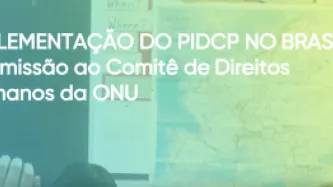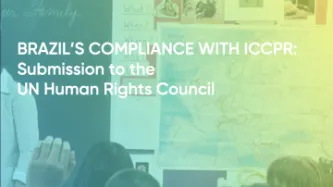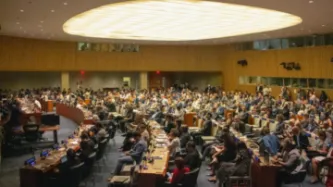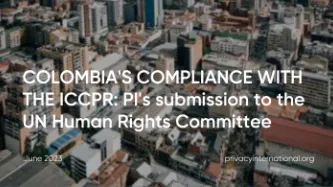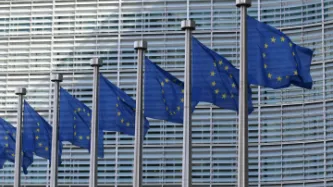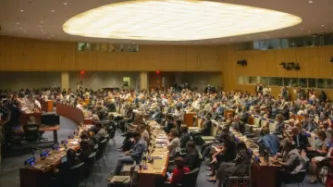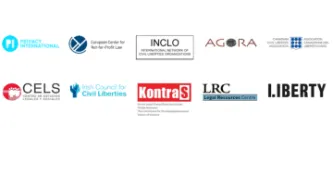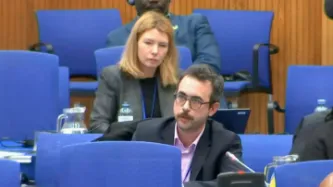Search
Content type: Advocacy
In August 2023, the UK Westminster Women and Equalities Committee launched a call for evidence into a short inquiry on women’s reproductive health.We submitted a response highlighting the increasing management of women’s reproductive healthcare through digital health initiatives. We raised concerns that these technologies can be privacy-invasive and result in highly sensitive personal information being shared in unexpected and potentially dangerous ways. We encouraged the Committee to ensure…
Content type: Advocacy
Privacy International joined civil society efforts to call the South African Parliament not to approve the draft General Intelligence Laws Amendment Bill 2023 (GILAB), which was approved by the Cabinet and introduced in Parliament.
The Bill was proposed by the South African government, after the Constitutional Court found the Regulation of Interception of Communications Act of 2002 (RICA) unconstitutional on multiple grounds.
The draft Bill fails to meet the human rights standards on many…
Content type: Advocacy
The European Commission proposed the PWD in December 2021 with the objective to improve the working conditions in platform work. In February 2023 and June 2023 respectively, the European Parliament and the Council reached their respective positions, with trilogue negotiations beginning in July 2023.
PI welcomes the PWD as a mechanism to protect workers’ rights in response to transformations in the workplace, specifically with regard to the growing adoption of algorithmic management systems and…
Content type: Advocacy
In the last few years, electoral processes and related activities have undergone significant changes, driven by the development of digital technologies.The use of personal data has redefined political campaigning and enabled the proliferation of political advertising tailor-made for audiences sharing specific characteristics or personalised to the individual. These new practices, combined with the platforms that enable them, create an environment that facilitate the manipulation of opinion and…
Content type: Long Read
TAKE ACTION TO STOP THE END OF PRIVACY IN PUBLIC1. IntroductionThe use of facial recognition technology (FRT) by law enforcement and private companies in public spaces throughout the UK is on the rise. In August 2023, the government announced that it is looking to expand its use of FRT, which it considers “an increasingly important capability for law enforcement and the Home Office”. The indiscriminate use of this dystopian biometric technology to identify individuals in public spaces is a form…
Content type: Advocacy
Dejusticia, Fundación Karisma, and Privacy International submitted a joint stakeholder report on Colombia to the 44th session of the Universal Periodic Review at the UN Human Rights Council.Our submission raised concerns regarding the protection of the rights to freedom of expression and opinion, to privacy, and to personal data protection; the shutdown of civil society spaces; protection of the right to protest; and protection of the rights of the Venezuelan migrant and refugee population.…
Content type: Advocacy
On 6th October 2023, we submitted our comments on the Regulation of Interception of Communications and Provision of Communication-related Information Amendment Bill (the Rica Bill), published in Government Gazette 49189, August 25th, 2023, in response to a call for comments issued by the Portfolio Committee on Justice and Correctional Services – a committee of the Parliament of South Africa responsible for overseeing responsible the Department of Justice and Constitutional Development.
In our…
Content type: Long Read
Introduction
The 28th of September marks International Safe Abortion Day. It remains a day necessary to mobilise and raise awareness of the continued struggles women and girls face when accessing reproductive healthcare, including access to safe abortion. Across the world, abortion continues to be criminalised, restricted and in some places under attack. All of which constitute severe obstacles for women and girls to fully exercise their human rights, particularly their right to privacy, which…
Content type: Advocacy
Em Junho de 2023, fizemos uma submissão para a 138ª Sessão do Comitê de Direitos Humanos, que ocorreu entre 26 de Junho de 2023 e 28 de Julho de 2023, em relação à conformidade do Brasil com o Pacto Internacional sobre Direitos Civis e Políticos (ICCPR) antes da adoção da Lista de Questões Prévias ao Relatório (LoIPR).Entre outras coisas, recomendamos que o Comitê de Direitos Humanos da ONU solicite ao governo Brasileiro que:Adira aos seus padrões internacionais e nacionais de direitos humanos…
Content type: Advocacy
In June 2023, we made a submission for the 138th Session of the Human Rights Committee that took place between 26 June 2023 and 28 July 2023 in relation to Brazil’s compliance with the International Covenant on Civil and Political Rights (ICCPR) before the adoption of the List of issues prior to reporting (LoIPR).Amongst others, we recommended the UN Human Rights Committee call on Brazil to:Adhere to its international and national human rights standards to uphold the right to privacy and the…
Content type: Advocacy
Our submission focussed on the evolving impacts of (i) automated decision-making, (ii) the digitisation of social protection programmes, (iii) sensitive data-processing and (iv) assistive technologies in the experiences and rights of people with disabilities.We called on the OHCHR to:Examine the impact that growing digitisation and the use of new and emerging technologies across sectors has upon the rights of persons with disabilities;Urge states to ensure that the deployment of digital…
Content type: Advocacy
We are responding to the UK Government's consultation to expand its powers around Technical Capabilities Notices and National Security Notices.
Background
Following Edward Snowden's revelations about the illegal and expansive secret powers of the US and UK intelligence agencies, the UK Government took the opportunity to, rather than reflect on what powers are proportionate in the modern era, to expand its arsenal of surveillance powers.
One of the powers it added was the ability to issue…
Content type: Advocacy
Our submission focused on (1) the ways in which states are adopting data-intensive ID systems; (2) the adoption by national immigration enforcement agencies of other privacy-intrusive modes of surveillance and control, including tracking by way of 24/7 Global Positioning System (GPS) technology and mobile device data extraction; (3) how the intensification of border surveillance technologies facilitates further human rights violations; (4) the impact of border externalisation and transfer of…
Content type: Advocacy
On the 17 January 2023, the UK Home Secretary appointed Lord David Anderson KBE KC to carry out an independent review of the Investigatory Powers Act 2016.The Investigatory Powers Act 2016 provides a legal framework for the use of investigatory powers by the UK security and intelligence agencies, law enforcement and other relevant public bodies. These powers include the interception of communications; the retention and acquisition of communications data and; equipment interference for obtaining…
Content type: Advocacy
This was submitted by PI and EFF for the sixth session of the Ad Hoc Committee, which is due to consider the text in August 2023.
Our submission covers provisions in the chapters related to procedural measures and law enforcement, as well as international cooperation of the proposed UN Cybercrime treaty (full title: Comprehensive international convention on countering the use of information and communications technologies for criminal purposes). We also provide general comments on Article 54…
Content type: Advocacy
In June 2023, we made a submission to the Human Rights Committee ahead of its 138th Session in relation to Colombia’s compliance with the International Covenant on Civil and Political Rights (ICCPR).
We called on the UN Human Rights Committee to make the following recommendations to Colombia:
The Electoral Law should ensure that the electoral register does not include personal data other than what is required to establish eligibility to vote. The law should define the minimum…
Content type: Advocacy
Privacy International contributed to the UNSR's report by submitting information on the work we have done as well as our Network of partners as we’ve monitored and responded to developments associated with the use of data and technology in the health care sector by governments and companies.
Content type: Advocacy
Privacy International (PI) notes the Bureau’s text of the WHO convention, agreement or other international instrument on pandemic prevention, preparedness and response (“WHO CA+”).
PI has sought to closely follow and engage with the discussions leading up to the draft treaty, despite the significant limitations to civil society participation in the process. In February 2023, we intervened during the briefing organised by the INB bureau and published our comments on the zero draft of the WHO CA…
Content type: Advocacy
Background
In August 2022, Amazon announced that they had entered into a definitive merger agreement to acquire iRobot, a company that specialises in designing and building consumer robots. The transaction was formally notified to the European Commission on 1 June 2023, while the UK Competition and Markets Authority (CMA) has already launched an investigation into the transaction since April 2023.
We believe that this acquisition is likely to significantly impede effective competition in and…
Content type: Advocacy
Privacy International welcomes the aim of the Cyber Resilience Act to bolster cybersecurity rules to ensure more secure hardware and software products. Nevertheless, we note that the proposal put forward by the European Commission contains certain shortcomings which could both hamper innovation and harm consumers who are increasingly relying on digital products and services.
It is essential these shortcomings, detailed below, are effectively addressed by the EU co-legislators through the…
Content type: Advocacy
This joint submission to the European Commission consultation on security-related information sharing was signed by Border Violence Monitoring Network (BVMN), Statewatch, Euromed Rights, European Digital Rights (EDRi), Access Now, Privacy International (PI), Refugee Law Lab (York University), Homo Digitalis and the Platform for International Cooperation on Undocumented Migrants (PICUM). Signatures were subsequently added from European Network Against Racism (ENAR), Dr Derya Özkul and Dr Niovi…
Content type: Advocacy
The submission provides PI’s information and analysis of some of the topics listed in the call. The widespread use of new technologies presents both opportunities and challenges for the protection of human rights, including the right to life and the right to privacy. PI believes that is essential that states take a human rights-centered approach in their use of these technologies, and ensure that their use is consistent with international human rights law. By doing so, states can ensure that…
Content type: Advocacy
Privacy International (PI) welcomes the zero draft of the WHO convention, agreement or other international instrument on pandemic prevention, preparedness and response (“WHO CA+”). PI has sought to closely follow and engage with the discussions leading up to the draft treaty, despite the significant limitations to civil society participation in the process.
PI believes that the zero draft offers a good basis for negotiations. In particular, we welcome the inclusion of a provision on…
Content type: Advocacy
Privacy International (PI), the European Center for Not-for-Profit Law (ECNL), International Network of Civil Liberties Organizations (INCLO), Agora, the Canadian Civil Liberties Association, Centro de Estudios Legales y Sociales in Argentina, the Irish Council for Civil Liberties, KontraS in Indonesia, the Legal Resources Center in South Africa, and Liberty in the UK welcome the opportunity to provide input to the global study of the UN Special Rapporteur on the promotion and protection of…
Content type: Advocacy
Following our comments on the draft Treaty text, PI's intervention, during the fourth session, focused on the provisions of the draft Treaty that deal with procedural measures and law enforcement. Specifically, we emphasised that the investigative measures contained in the draft Treaty should only be limited to serious offences only that are established by the Treaty. In addition, we urged delegates to remove a provision contained in the draft Treaty text that would allow authorities to exploit…










